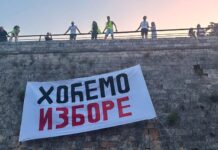I’ve been in self-isolation for five weeks. I’m spending this time in an apartment in Ljubljana. I live alone and have no pets, which means it’s been over a month since I’ve touched anyone. Still, I consider myself to be lucky as I remain healthy and, frankly, my life hasn’t changed very much. I am used to living alone and taking care of myself and the apartment I live in. I’m able to work from home, which gives my days structure and purpose. Because I am privileged enough to not have to worry about my health or my job, I have plenty of time to think. I think about how I’m spending this time, what I’m learning about myself, and the meaning of all this. I’m perfectly aware that I will never know this meaning if such a thing exists. I have, however, come to a realisation that is a certain and undeniable truth: I no longer have any wish to attend a silent yoga retreat.
My days in isolation don’t vary much. I wake up at 7:45. I do yoga every morning. I have both a cup of coffee and a cup of tea as I read the news and reply to emails. I work from 9 to 5. I go on walks around my neighbourhood. I have Skype coffee dates with my friends and I speak to my mother every evening after the 7 o’clock news. I buy groceries for myself and my grandmother every Friday and deliver them to her door. I plan my meals a week in advance in an effort to only buy things I need. I’m treating myself to meals I enjoyed when I was 16 and living alone for the first time. I bake a loaf of bread every Saturday and enjoy it over the weekend. I am not ashamed to admit that I have dessert every single day. On weekends, I try to find new routes around my neighbourhood. I take long strolls listening to podcasts and enjoy the spring sunshine. I spend my time doing things that are familiar and comfortable. My little corner of the world is calm, easy, and predictable. I am fully aware that this is all an elaborate coping mechanism, and that my need for such a routine demonstrates just how worried and afraid I am.
This is nothing like anything I’ve ever experienced before. What makes this period so unusual and uncomfortable is that for the first time in my lifetime, the crisis isn’t happening in a faraway country. It’s happening both in Slovenia and in almost every country in the world. This crisis is both global and deeply personal. So far, it has taken over a hundred thousand lives and has in some way affected the lives of almost every single person in the world. In a very short time, it has catalysed drastic social, economic, environmental, and political changes. Many of us can recognise the significance of this pandemic and the effects it will leave. At the same, most of us feel completely powerless. I have never felt less heroic, as there is little I contribute. I am not a doctor or a nurse, a scientist or a politician. I’m not wealthy or powerful. All I can do is stay at home, remain in isolation, and follow the recommended protective measures.
But soon, the infection rate will fall, cases will decline, and most people will have recovered from the virus. Restrictions will be lifted, humankind will survive and most of us will still be alive – but we will inhabit a different world. It is then, that I, and each of us, will play a part in shaping this new world. The decisions we and our governments will make in the next few weeks will most likely determine our reality for years to come. This is the thought that has occupied my mind over the past five weeks.
My last day before self-isolation was Thursday, the 12th of March. That afternoon, I was at the office having my usual afternoon cup of coffee with a co-worker. We both knew this was to be our final day at the office, as the number of confirmed cases in Slovenia was growing dramatically. During this final coffee break, we discussed the headlines, the pandemic, and the vote that was scheduled for the next day, which would confirm Janez Janša’s third government. As I wondered why I have to submit a certificate of no convictions for every job application, while the position of “prime minister“ required no such document, my co-worker responded:
»I’m glad Janša will be back in power. I’m a liberal and a leftist, but we need a right-wing government to take care of things and sort out this crisis«.
While I couldn’t disagree more, his statement did not surprise me. Still the more I thought about it, the more questions it brought up in my mind. How could he possibly hold this view? Given all the convictions, the scandals, and the corruption displayed by this party and their previous governments? How could he perceive this party as capable and equipped to handle such a crisis? Most importantly, I wondered: if this is the position of someone who identifies as left-wing, what chance does the left have to win an election?
The next day, Janša had his government and I stayed at home. Since that day, reading the news has been an otherworldly, absurd and surreal experience. To demonstrate what I mean, here are some headlines from the past month:
19. March – Salary increase for ministers and secretaries of state
20. March – Presence of journalists prohibited at government press conferences
21. March – Journalist Association of Slovenia and RTV SLO: Attacks on public broadcaster are unacceptable
8. April – In a letter to the Council of Europe, the government responds to criticism of pressures on the media
10. April – A security equipment deal worth almost 200 million involves relatives of ministers
17. April – The European Broadcasting Union calls on the Slovenian government to respect the independence of RTV Slovenia
12. April – Police officers received protective masks intended for cooks
16. April – The state paid 860,000 for masks made from napkins
17. April – Minister Počivalšek: The masks are not made of paper, they are made from non-woven material
If Slovenia could produce a talent that could tackle these headlines in the style of Zoran Kesić or Zoran Šprajc, the evening news might be easier to digest. I mean, napkin masks and “non-woven material”? Comedy gold.
On a more serious and worrying note, in addition to the changes highlighted in the headlines above, Slovenia now has a new Head of the National Public Health Institute, a new Chief of the General Staff of the Armed Forces, a new Director of the Intelligence and Security Agency, and three new members of the supervisory board at RTV Slovenia. These new appointments will no doubt prove to be significant in determining the future of our country. And as much as I’d like to keep laughing at the absurdity of recent events, I remain entirely convinced that come the next election, the SDS party will, once again, win the majority. Since that conversation with my co-worker, I’ve been wondering how this is possible. Why do they keep winning? More importantly, why does the left keep losing and what are they doing wrong? To gain some understanding of the issue, I’ve read numerous articles, analyses and listened to various interviews and podcasts. As I assumed, this is not unique to Slovenia. The left is experiencing an identity crisis all over the world.
Over the past 5 years or so, we have witnessed many examples of right-wing movements and politicians that were ridiculed and underestimated at first, then gained massive support, and ultimately triumphed. The Brexit vote and Donald Trump’s election are the most obvious instances of outcomes that were previously thought to be impossible. Even as the impossible became the reality, many of us assumed the consequences would be so controversial and destructive that the opposition would easily (re)claim power. Years later, the UK is no longer an EU member, the Tories are in power, and Trump remains president. Yet the idea that these outcomes are irregularities persists. Many of us on the left still feel that this period is »abnormal« and that life will return to normal afterwards. After Trump, after Johnson, after Janša. We believe that soon, the natural progress of things will resume, despite being proven wrong election after election, vote after vote.
The progressive view of history preaches that social progress and the triumph of progressive ideas are natural and inevitable. As a result, I find that the left doesn’t think they have to fight on the same grounds that the right does. To me, it seems that they remain satisfied with their beliefs, with being »on the right side of history«. They trust that they will ultimately achieve their ends and don’t seem to be concerned with how to actually achieve that. The reality is that it is not enough for them to be right. They also have to win. Social progress is not inevitable, it must be achieved.
When I feel overwhelmed by these thoughts, I turn to a part of the internet that brings me comfort and a sense of hope. A handful of Slovene Instagram profiles emerged during the past year, dedicated to sharing screenshots of conversations sent in by their followers. The most prominent of the group, @delozlom, @domozlom, and @vladozlom, share the experiences of young people as they keep up navigate the job market, struggle to pay rent in the city, search for available apartments, keep up with the news, and other aspects of contemporary young adulthood. In addition to these posts, they share important information on the rights of workers, tenants and resources for people in need. These profiles are a space where young people can find advice, share our anger, disbelief, and be as uncompromising with our leftist views as Janša and his supporters are with their right-wing views. Because of their large following, they have connected with unions and syndicates, organised events, and are often featured in mainstream media and news. They play an important role in uniting and mobilising young people and encouraging them to participate in protests, strikes and other political actions. I find comfort in the fact that a few young individuals found an inventive use for this medium, that they recognise their responsibility, and utilize their power. I find hope in the thought that this pandemic will anger, radicalise and mobilise even the most apolitical of my peers. Finally, I feel hopeful when I read the call to protest “we’ll meet on the street!”.
Maksina Podpohorska












